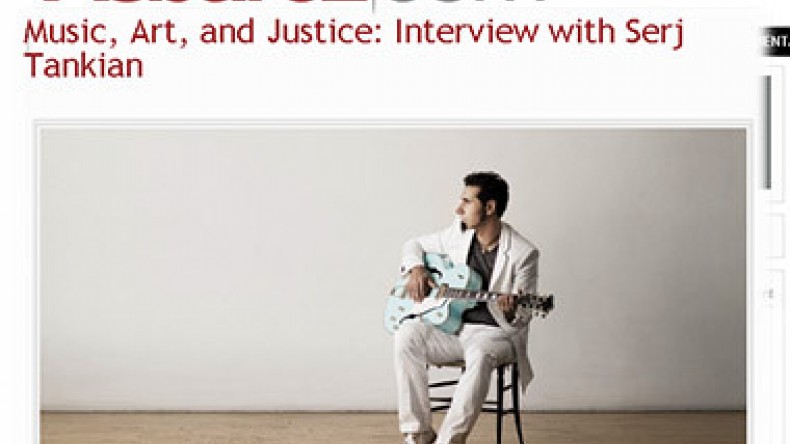
Music, art, and justice: Interview with Serj Tankian
Armenian-American rock musician, composer, multi-instrumentalist, poet, and political activist Serj Tankian, who is also best known as the lead vocalist of the metal band System of a Down, has just gifted his fans with his new Jazz-Iz-Christ studio album. Although initially the album was planned to feature primarily rock music, jazz took over as the main style. True to his patriotic values, Serj Tankian mentions Armenia in his new album and even introduces a new song dedicated to Yerevan, titled “Yerevan to Paris.” Armenpress News Agency interviewed Serj Tankian regarding his new album, future plans, concerts, and patriotism, according to Asbarez.com.
ARMENPRESS: Mr. Tankian, your latest album Jazz-Iz-Christ is quite a success, having been cleared off of store shelves in a matter of a couple of weeks after release. Why did you choose this name for your album?
SERJ TANKIAN: First off, thank you Roza. Jazz-iz-Christ is really a great collaboration between myself, Tigran Hamasyan, Valery Tolstov, and Tom Duprey with other amazing musician friends playing on there as well.
I decided to call it Jazz-iz-Christ for a few reasons. The first is a reaction to purists in the jazz and classical world that usually reserve respect for their own elitist perspectives of the genres.
The second was to trigger calls for blasphemy among right wing Christians, especially in the U.S., who judge so much that Jesus would never be able to enter their spirits.
And third, it sounded fun.
A.P.: You have a song in the album called “Yerevan to Paris.” How did you create it? What were your feelings while creating it?
S.T.: Most of the songs were created in my studio and then shared and worked on with the other musicians, though there are a handful of songs actually also written by the other guys.
“Yerevan to Paris” was named as such because it imbued the sounds and tastes of both Yerevan and Paris in some ways. Armenian melodies dancing against lounge tinged jazz, underscored by beats reminiscent of some of the music out of the Saint Germain area of Paris.
A.P.: Mr. Tankian, is it true that in September you will have concerts in Russia?
S.T.: Yes. My first concert in Russia is with System of a Down in early August at Anapa called the Kubana Festival.
I will then return to Russia with a Ukrainian orchestra to play a hybrid of my Elect the Dead Symphony and Orca, my new symphony we just released.
A.P.: Well, when will you have a concert in Armenia? We are looking forward to it!
S.T.: We have not booked anything for Armenia this year but hope to be back soon for a show.
A.P.: At the beginning of the year you announced that you will be cooperating with famous hip-hop singer Tech N9ne and will be participate in working on his new album called Something Else. Is there any news about this cooperation?
S.T.: Yes, Tech N9ne just released a video for the song “Straight out the Gate,” which includes my performance.
I really liked his rhythmical expertise and intentional lyrical strength, and agreed to perform on the track.
A.P.: In recent months you have been doing music-embedded painting? We have read that you have never painted in your life. How do you feel after this experience? Both music and painting are ways of creating something. If music is your life, then what is painting for you now?
S.T.: You can say that it is all art: music, painting, poetry, and most of what I do.
I came up with a unique concept of paintings triggering exclusive music and other content associated with it and have been working on that integration.
My methodology includes composing a piece of music, and then creating the visual work that represents that piece of music, and finally tying them together so that the viewer is able to hear the painting and see the music.
We’re working on putting together a gallery exhibition somewhere in L.A. in November of this year to show how the marriage between the music and paintings occur. We will also be producing two different giclées and one lithograph for sale at that time.
A.P.: You have created paintings based on pieces of music. What kinds of music inspire you?
S.T.: All kinds of music inspire me. It is the intention and emotive elements that I pay attention to, not so much the genre.
A.P.: In your youth, you attended Rose and Alex Pilibos Armenian School. What was the most important lesson that you learned there?
S.T.: Respect and love for my culture and my people, I guess.
A.P.: You have organized many projects to help the Armenian Genocide be recognized. We are grateful to you for such great work. What will be your next step concerning the recognition and Armenia?
S.T.: I am working on a few different things for that. I will discuss them when they are approved and in progress in the press at that time.
A.P.: Your grandfather was an Armenian Genocide survivor. What kind of stories were you told about the Genocide?
S.T.: My grandfather had many horrific stories of persecution and survival. I am glad we were able to record his memoirs before he passed away giving myself and our family a glimpse into our family history and the history of our people as well.
A.P.: You have already published books of poems. Will you write an autobiography one day?
S.T.: I’m not sure about that yet. I would like to pen a non-fiction account of the intersection of justice and spirituality one day.
A.P.: All Armenians adore and love you very much. What would you tell to your Armenian fans?
S.T.: Yes el tsez shad em siroum. Mer janabarhe khrtin a bayts artaroutiamp bidi haghtaharenk mer polor tejvaroutiounnere. (I love you all very much. Our journey is difficult, but we must overcome all obstacles through justice.)
Newsfeed
Videos






























